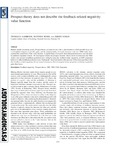Prospect theory does not describe the feedback-related negativity value function.
| dc.contributor.author | Sambrook, TD | |
| dc.contributor.author | Roser, ME | |
| dc.contributor.author | Goslin, Jeremy | |
| dc.date.accessioned | 2019-07-12T14:36:41Z | |
| dc.date.available | 2019-07-12T14:36:41Z | |
| dc.date.issued | 2012-12-01 | |
| dc.identifier.issn | 0048-5772 | |
| dc.identifier.issn | 1540-5958 | |
| dc.identifier.uri | http://hdl.handle.net/10026.1/14634 | |
| dc.description.abstract |
Humans handle uncertainty poorly. Prospect theory accounts for this with a value function in which possible losses are overweighted compared to possible gains, and the marginal utility of rewards decreases with size. fMRI studies have explored the neural basis of this value function. A separate body of research claims that prediction errors are calculated by midbrain dopamine neurons. We investigated whether the prospect theoretic effects shown in behavioral and fMRI studies were present in midbrain prediction error coding by using the feedback-related negativity, an ERP component believed to reflect midbrain prediction errors. Participants' stated satisfaction with outcomes followed prospect theory but their feedback-related negativity did not, instead showing no effect of marginal utility and greater sensitivity to potential gains than losses. | |
| dc.format.extent | 1533-1544 | |
| dc.format.medium | Print-Electronic | |
| dc.language | eng | |
| dc.language.iso | eng | |
| dc.publisher | Wiley | |
| dc.subject | Feedback negativity | |
| dc.subject | Prospect theory | |
| dc.subject | ERP | |
| dc.subject | FRN | |
| dc.subject | P300 | |
| dc.subject | Dopamine | |
| dc.title | Prospect theory does not describe the feedback-related negativity value function. | |
| dc.type | journal-article | |
| dc.type | Article | |
| plymouth.author-url | http://www.ncbi.nlm.nih.gov/pubmed/23094592 | |
| plymouth.issue | 12 | |
| plymouth.volume | 49 | |
| plymouth.publication-status | Published | |
| plymouth.journal | Psychophysiology | |
| dc.identifier.doi | 10.1111/j.1469-8986.2012.01482.x | |
| plymouth.organisational-group | /Plymouth | |
| plymouth.organisational-group | /Plymouth/Faculty of Health | |
| plymouth.organisational-group | /Plymouth/Faculty of Health/School of Psychology | |
| plymouth.organisational-group | /Plymouth/REF 2021 Researchers by UoA | |
| plymouth.organisational-group | /Plymouth/REF 2021 Researchers by UoA/UoA04 Psychology, Psychiatry and Neuroscience | |
| plymouth.organisational-group | /Plymouth/REF 2021 Researchers by UoA/UoA04 Psychology, Psychiatry and Neuroscience/UoA04 REF peer reviewers | |
| plymouth.organisational-group | /Plymouth/Research Groups | |
| plymouth.organisational-group | /Plymouth/Research Groups/Centre for Brain, Cognition and Behaviour (CBCB) | |
| plymouth.organisational-group | /Plymouth/Research Groups/Centre for Brain, Cognition and Behaviour (CBCB)/Brain | |
| plymouth.organisational-group | /Plymouth/Users by role | |
| plymouth.organisational-group | /Plymouth/Users by role/Academics | |
| dc.publisher.place | United States | |
| dcterms.dateAccepted | 2012-08-28 | |
| dc.identifier.eissn | 1540-5958 | |
| dc.rights.embargoperiod | Not known | |
| rioxxterms.versionofrecord | 10.1111/j.1469-8986.2012.01482.x | |
| rioxxterms.licenseref.uri | http://www.rioxx.net/licenses/all-rights-reserved | |
| rioxxterms.type | Journal Article/Review |


